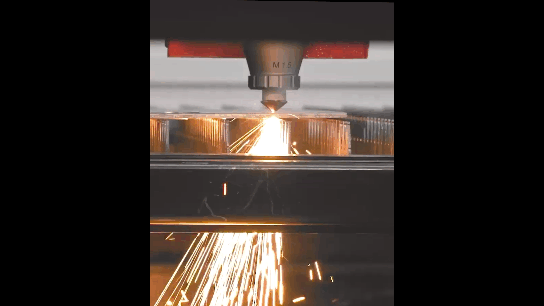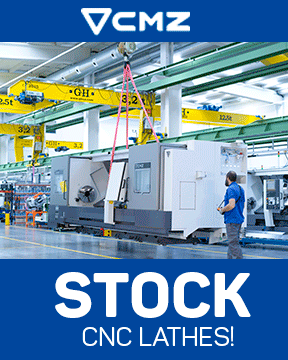Renishaw celebrates 50 years of engineering innovation
Published: | Renishaw plc, sustainability, production, Measuring

This year, engineering technologies business, Renishaw, is celebrating its 50th anniversary. The company, which was founded on 4 April 1973, will mark this significant milestone with a year of global activities including open house events at its largest sites, family days for employees and a ‘50 at 50’ charity initiative which will see £150,000 donated to 50 not-for-profit organisations in the 36 countries where it has offices.
Will Lee, Renishaw’s Chief Executive says, “This is a year to reflect on the tremendous achievements of our co-founders and employees past and present, who have done so much to advance precision manufacturing globally, and to look forward with confidence to future decades of innovation and growth.”
He adds, “The formula that has ensured Renishaw’s success over the past 50 years remains at the heart of our approach to business – investing heavily in research and development to ensure a continuing stream of world-leading products; a commitment to high-quality in-house manufacturing that ensures we can meet the exacting requirements of our global customers; and a focus on excellent local customer service and support through our wholly owned subsidiary operations.”
Lee concludes, “On behalf of Renishaw, I would also like to thank our customers and suppliers, many of whom we have had close relationships with for most of our history and with whom we have shared mutual success, and our other stakeholders, including our local communities who have been highly supportive of our growth and have also shared in our success.”
Company origins
Renishaw was formed to commercialise the invention of a device that solved a dimensional measurement problem faced by Rolls-Royce when manufacturing the Olympus engines that powered the supersonic Concorde aircraft.
(Sir) David McMurtry, now Executive Chairman of Renishaw, was at that time Assistant Chief of Engine Design for all Rolls-Royce engines manufactured at Filton, UK. The problem was so urgent that McMurtry worked at his home over a weekend, where he designed and built a prototype touch-trigger probe for co-ordinate measuring machines (CMMs). The probe not only solved the problem faced by Rolls-Royce, but also similar challenges being faced by many precision manufacturers around the world, ultimately allowing measurement on CMMs to be automated for the first time.
Rolls-Royce took out a patent on McMurtry’s original design, which was filed on 21 September 1972, with him acknowledged as the inventor. Around this time, he discussed the probe with a colleague, John Deer, now Renishaw’s Non-executive Deputy Chairman, who had a background in machine shop engineering and wanted to have his own business.
They both saw the wider commercial opportunities for the invention and Rolls-Royce agreed to license the patent to them but would only do so if they had a limited liability company. For expediency, they therefore purchased an ‘off-the-shelf’ company and on 4 April 1973, the first Renishaw company, Renishaw Electrical Ltd., was registered.
McMurtry continued to design the early products in Wotton-under-Edge, Gloucestershire, UK, when he moved there in 1973. However, following the receipt of Renishaw Electrical’s first commercial order from British CMM manufacturer, LK, production moved to Deer’s home in Chepstow, UK, where the garage was the machine shop, assembly took place in a spare bedroom and administration at the dining room table. In 1976, the fledgling company purchased its first commercial premises, a former ice-cream factory in Wotton-under-Edge. At that time the company had just nine employees but was already supplying most of the world’s manufacturers of co-ordinate measuring machines.
Renishaw was ‘born global’, supplying the majority of its products to overseas markets from its early years due to the location of CMM manufacturers, and today 95% of annual sales are derived from exports, with its largest markets being China, USA, Germany and Japan. The company realised that to fully support a highly technical product and gain valuable market feedback, a direct presence in key markets was vital. Its first subsidiary office was opened near Chicago, USA in April 1981, followed by a Tokyo office the following year. Renishaw now has over 70 offices in 36 countries and this year is also celebrating 30 years in China and 20 years in Sweden.
Although, the touch-trigger probe was invented for use on measuring machines, McMurtry and Deer quickly saw the potential for its use on computer numerical control (CNC) machine tools and in 1977 Renishaw launched its first commercial probe for machine tools, which was demonstrated that year by Kearney and Trecker on a milling machine at the EMO Exhibition in Hannover, Germany. By 1981, when the trade show returned to Hannover, 32 machine tool manufacturers had Renishaw probes fitted to machines on their stands, with the first probe for CNC lathes also launched that year.
Although today, a significant amount of Renishaw’s business is still derived from contact and non-contact laser measurement systems for CMMs and machine tools, the Company now supplies a wide range of metrology systems for calibration, position feedback and gauging, plus associated accessories including styli and fixturing. It has also applied its core expertise in measurement, manufacturing and process control to develop systems for non-destructive testing using Raman spectroscopy, robots and drug delivery systems for brain surgery, and is also a technology leader in the field of metal additive manufacturing (3D printing).
Global impact
Today Renishaw plc is listed on the London Stock Exchange’s FTSE 250 index, with a current valuation around £3 billion. It employs 5,200 employees in 36 countries, including 3,400 staff at its sites in the UK, primarily in Gloucestershire and South Wales.
Over the past 50 years, Renishaw’s products have revolutionised key aspects of component manufacturing and scientific research, contributing to the ability to make the high performing, precision products that we use in our daily lives. From the manufacture of aircraft, cars, smartphones, electric vehicle batteries and solar panels, to brain surgery and dentistry, there is barely an industry that does not in some way benefit from the Company’s ongoing innovations.
In a world where it is increasingly vital for businesses to reduce their environmental impacts, Renishaw’s products are helping its customers to be more sustainable and productive, by reducing their energy consumption and waste, and by helping them to research and manufacture products that are more efficient in use and therefore enable their own customers to use less energy.
Whilst Renishaw’s contribution to our world may not always be apparent, often due to commercial confidentialities, its impact can be seen all around us, from projects below ground to space exploration. The precision-fit concrete panels for the Channel Tunnel, which links the UK and France, were inspected using Renishaw measurement systems; the Terracotta Warriors in China were investigated using the Company’s analytical equipment; and some of the European Space Agency’s satellites use Renishaw encoders to ensure that transmitters and receivers are precisely aligned for communications to and from Earth.
Commitment to the future
Whilst this year Renishaw is celebrating its past achievements, the Company is also focused on ensuring the continuing success of the business through investments in people, product development and production capacity, all underpinned by a commitment to be a more sustainable organisation.
The Company has been committed to the manufacturing of its own products since its formation and utilises many of its own products within its machining facilities. Whilst much of its production is performed in the UK, it has carried out the assembly of metrology products in Ireland since 1981, and today also has a significant operation in Pune, India. In Summer 2022, the Company announced a significant new investment at its Miskin site in South Wales, to increase manufacturing capacity and to help meet its Net Zero emissions targets. An investment of around £65 million will see a phased development of 400,000 sq ft of additional low-carbon buildings at the 193-acre site to the west of Cardiff, consisting of two new production halls and an employee welfare facility. The existing production halls will also be refurbished to reduce their greenhouse gas (GHG) emissions. This significant investment will almost double the footprint of the site which Renishaw acquired from Bosch in 2011 and currently accommodates around 700 employees.
The additional capacity will allow for increases to machining operations and the assembly of products already built at the site, including Renishaw’s world-leading metal additive manufacturing (3D printing) machines.
Future talent
A key aspect of investing for future success lies in Renishaw’s ability to retain and recruit skilled individuals. The Company has a strong track record of growing its own talent pool, having started an apprenticeship programme in 1979 and recruiting apprentices every year since that time, even during business downturns. The 50th year will again see a significant investment in future talent, with the aim to recruit around 100 graduates and 60 apprentices in the UK.
However, the hard work starts years before a young person will ever be employed by Renishaw, with a science, technology, engineering and manufacturing (STEM) education outreach programme in the South West of England and South Wales run by four employees who are dedicated to engagement with both primary and secondary schools. Following the success of a dedicated education centre at the Miskin site, in May 2023 Renishaw will also formally open a STEM education centre at its HQ site in Gloucestershire, UK, which will support students with their science, technology, engineering and maths studies.
Sustainability targets
In 2022 Renishaw announced that in addition to its commitment to achieve a science-based Net Zero GHG emissions target for all its business operations by 2050, that it would also achieve Net Zero for Scopes 1 and 2 emissions by 2028. Both these targets will be validated and monitored by the globally respected body, the Science Based Targets initiative (SBTi).
A vital consideration for the new construction programme at the Miskin site, is to ensure that this new target can be achieved. Therefore, the new facilities will be built with the latest technologies and materials to ensure that they will be Net Zero in operation, and the build also aims to minimise the amount of embodied carbon within the building materials used in construction.
By the end of 2024, Renishaw also aims to have refurbished the two existing production halls at Miskin to reduce their carbon emissions, including new energy-efficient cladding and the replacement of existing heating systems.
These sustainability investments complement initiatives at Renishaw’s other global sites, including large investments in roof-mounted solar panels, new car port solar panels, EV charging points to support the Company’s move to ultra-low emission (ULEV) fleet vehicles and a new ULEV salary sacrifice scheme, initially for its UK employees, and feasibility studies to assess the viability of wind power.
To find out more about Renishaw visit www.renishaw.com
Quick Links
Published By
4 Mayfair Court
Cleethorpes
South Humberside
North East Lincolnshire
DN35 0QG
© Copyright Roger Barber Publishing , all rights reserved.
Terms and Conditions apply. This website uses cookies, click here for blocking details. Our Privacy Policy is available here.





